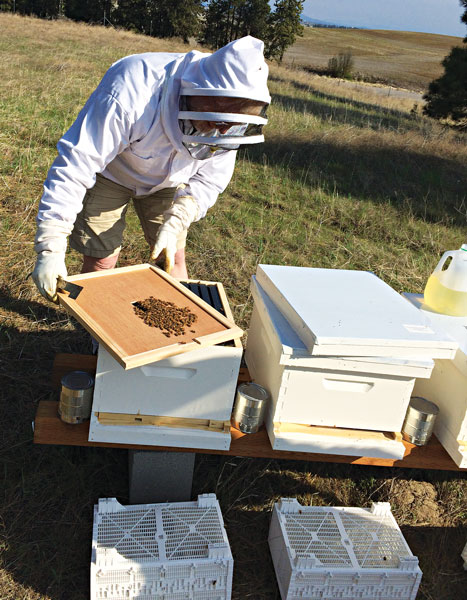It’s the time of year when folks interested in honey bees turn their thoughts toward beekeeping as a hobby. While keeping bees is fascinating and has the added benefits of garden/flower pollination and honey (sometimes), it’s a good idea to consider seriously various aspects of this hobby before blindly jumping in.
On the up side, bees are fascinating creatures, and I have spent many an evening in front of my hives watching the bees come and go. I enjoy seeing the bees fly in with their pollen sacks filled with brightly-colored pollen. I have watched as the bees greet one another at the door, and I have seen guard bees protect their home against wasps and yellow jackets. And, the interior views of the hive are just as interesting as the exterior views.

In addition to being fascinating creatures, keeping bees will increase the local plants’ flower production, which in the vegetable garden and berry patch, result in higher edible yields. In our area, the number of flowering serviceberry bushes has increased exponentially in recent years, a phenomenon that we attribute to our bees. We also get a great harvest of blackberries and blueberries, also a result of honey bee pollination.
Finally, bees produce honey and may even produce excess for the beekeeper. Many people enjoy honey in their morning tea or coffee, on toast or in their baked goods. My neighbors annually beg me for local honey, as there is some evidence that consuming local honey helps reduce allergy symptoms.
These aspects of beekeeping, along with the fear of bee stings, are what most people consider before getting into the hobby. However, keeping bees can be time-consuming and expensive, cause issues with local government and neighbors, and, if done carelessly, be detrimental to bees, both ones in a new hive and in general. These aspects of beekeeping also need consideration before the prospective hobbyist assembles a hive or purchases bees.
So, the first thing a prospective beekeeper should ask is whether he or she is willing to take the time to learn about bees. To understand and care for bees, prospective beekeepers should learn as much as possible about honey bees, their natural behavior and how colonies function. This take a bit of time and should be done before purchasing a hive and bees. There are plenty of resources available – YouTube, books, beekeeping classes – but they all take a little bit of time and should be accomplished before getting bees in the spring. Beekeepers also need to be able to recognize bee pests and diseases so that they can ensure that their bees remain healthy and do not spread disease to other colonies in the area.
Another time-consuming aspect of the hobby is caring for the bees after getting them. Initially, the beginning beekeeper will be feeding bees every few days and will need to open and inspect the hive every few weeks. Throughout the summer, the beekeeper needs to check the outside of the hive weekly and, to get the best information about the colony, it pays to weigh the hive frequently. At the end of the summer, honey needs to be harvested and extracted. In early fall, hives may need to be moved or protected from weather, and the bees will need feeding, especially if the beekeeper harvested honey. Throughout, the beekeeper needs to monitor hive and honey bee health and treat for disease.
Beekeeping is time-consuming, but it also costs money. It is not an inexpensive hobby, although beginning beekeepers can take some steps to reduce their cost. To start out, the beginning beekeeper will need at least one hive (and there are various types), frames or top bars upon which the bees will build comb, a hive tool, a smoker, and protective clothing. All this can add up to about $200 worth of equipment, and that is even before the prospective beekeeper purchases bees, which cost about $150 for a package. During the first spring and sometimes in the fall, beekeepers need to buy sugar, lots of sugar, as it is used as feed supplement for the bees.
Beginning beekeepers need to consider the location of the new hive. Anywhere the beekeeper places a hive, there may be local ordinances or regulations that govern honey bee hive placement. The beginning beekeeper also needs to check with neighbors and family members and talk to them about the hives. While bees are generally not aggressive, most people fear bee stings and need to be educated about bees, their function, and their behavior before they will be willing to have a hive nearby.
Finally, the beginning beekeeper needs to commit to keeping healthy bees, both for the new hive and for honey bees in general. Certainly, the beginning beekeeper does not want to lose the time and money invested in a new hive. Beyond that, however, certain bee diseases and pests can spread to other hives and cause devastation to other honey bee colonies and to native pollinators like bumble bees. Lazy beekeeping is irresponsible and harmful to the environment.
So, before you decide to keep bees, please think long and hard about how much time, energy and money you are willing to expend. Beekeeping is a great hobby, but it’s better when hobbyists are committed to doing right by honey bees.
If you are interested in learning more about bees, check out beekeeping classes in your area (wpbeekeeper.org, backyard-beekeepers.org, iebees.com), which are usually held in February or March. Margo Buckles is a WASBA-certified Journeyman beekeeper based near Cheney, Washington. She is currently the Vice President, Education, for the West Plains Beekeepers Association.
